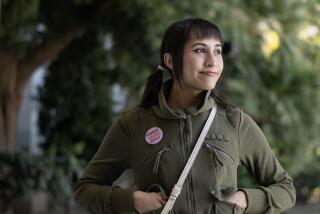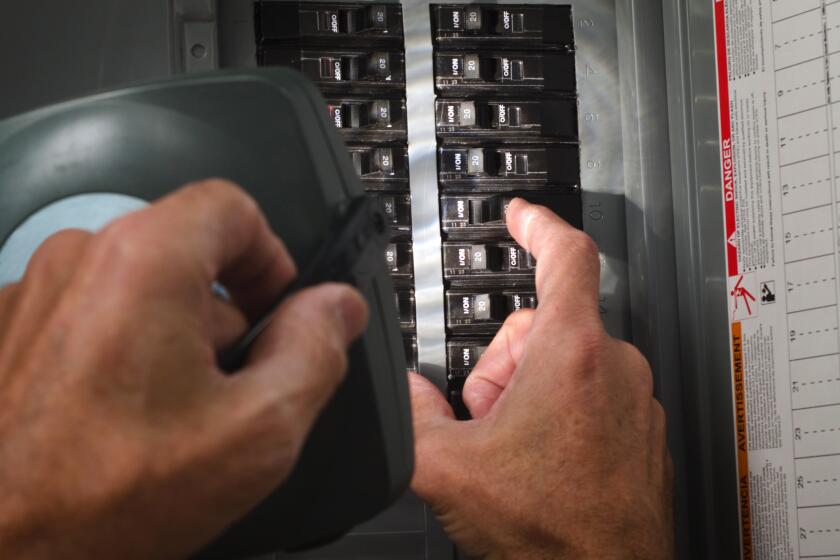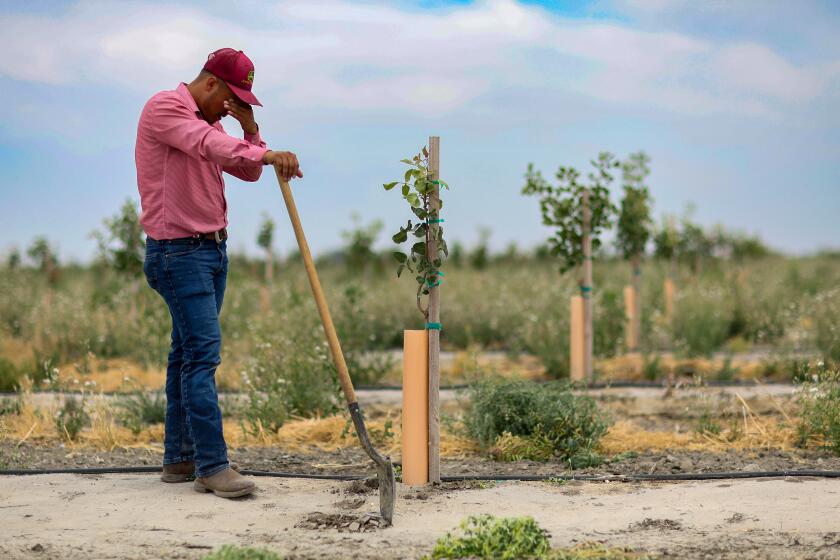Relying on Tradition, Not Frills
There are few thrills at Burbank Community Church. No synthesizers or drums. No choir or theatrical displays of emotion, except for the occasional palm raised heavenward during prayer or a solitary “yes” or “Amen” from a congregant seated near the rear.
The worship of God is serious business, explains the Rev. Jerry Allen Jones, the 69-year-old Tennessee-bred pastor and self-styled “middle-of-the-road conservative.”
“It’s just like, if you try to sleep in the same spot that you got into the bed [on the edge of the mattress], you’re liable to fall right out,” he says.
Jones, who founded this nondenominational Christian church 31 years ago, is an anomaly in modern religion: a traditionalist who disdains the way so many churches try to attract larger crowds with contemporary music and modernistic interpretations of Scripture.
His congregation is shrinking, with possibly as few as 130 members. But he insists that their faith is strong and that he will not bow to what he contemptuously calls “contemporizing.”
“Contemporizing leads to compromise and a real breakdown, a degeneration of the spirituality of the church,” he says.
His is the voice of religious fundamentalists alienated by what they consider moral compromise, says Donald Miller, professor of religion and director of the Center for Religion and Civic Culture at USC. “To them,” Miller says, “the more traditional expression of religion represents greater purity and spirituality.”
Before delivering his sermon on a recent Sunday morning, Jones walks through the nearly empty aisles, greeting the trickle of worshipers.
Most are regulars, like Angelica Fleming and her husband, Matthew. The couple attends an early morning Bible discussion group that Jones conducts before services.
At this Sunday’s discussion, he spoke of 2 Corinthians Chapter 4, from the New Testament: “In their case, the god of this world has blinded the minds of the unbelievers, to keep them from seeing the light of the gospel of the glory of Christ, who is the image of God.”
Fleming, 50, the owner of a hair salon a block from the church, met Jones four years ago. “He found out I loved the Lord; he loved the Lord, and he invited me to come.”
Leo De Los Santos, a church volunteer, wandered into the church in 1975, when the congregation was meeting in a Burbank Boulevard office building. He went only because he was interested in dating a girl who volunteered there. She ended up marrying someone else, but De Los Santos said Jones’ ministry appealed to him.
“It’s a realization that when you’re headed in the right direction, there is hope for a better life. You get a better outlook,” he says.
Years later, after De Los Santos married his wife, Peggy, the family began to attend another church. When the couple started having marital problems, they returned to Jones’ church, De Los Santos says.
“When it comes to counsel, he’s great at that. He loves people and he opens up to you,” he says.
On this Sunday, there are no more than 50 people scattered throughout the church. Behind the pulpit, a painting of a large dove, flying before a golden cross, dominates the wall. The chairs that fill the sanctuary are red with fading cushions. The carpet that runs down the aisles is a tattered maroon.
With an American flag hanging in the corner of the room, Jones delivers his sermon in an even tone. At certain points, his voice rises in a powerful crescendo, hinting at his Pentecostal roots. He quotes Scripture without pointing to specific verses and rarely refers to his Bible. Most of what he has to say comes from the manuscript he finalized that morning: “The Character of Christ.”
Music is provided by Jones’ wife of 50 years, Lucille, playing the piano, and Fleming’s husband on the trombone. Jones leads every chorus, belting out each song in his raspy baritone. That is his only display of emotion.
“There is no jumping, hollering or carrying on,” he repeats later. “Does God need us to go on hollering? Is it for his benefit or is it for ours?”
It was 1949 when Jones, a 17-year-old self-proclaimed “good ‘ol boy from a down-home, cotton-picking town”--Ripley, Tenn.--received his calling to be a minister.
He tells the story in his office an hour before he delivers his sermon, remembering how God’s spirit moved him to teach the lessons he learned from his father, a Pentecostal minister, and how he broke from the emotional style of Pentecostalism.
His white hair rests neatly in place on his head. His black tie is pulled up tightly around his collar. A bookshelf extends from one wall to the other, piled high with volumes on religious philosophy, the meaning of Mormonism and “Christ’s Witchdoctor.” There is a painting on the wall of the pastor a few decades back. He is wearing a white suit, red shirt and red tie. He leans forward into the frame, his elbow resting on his right knee.
“Old-line Pentecostalism,” he remembers. “People just hollering and carrying on. Even as a child, something inside of me said, ‘This is not me.’ I always kind of thought God didn’t need all of that stuff. People do that kind of stuff because of tradition. I’ve grown beyond that.”
After graduating from Ripley High School and marrying Lucille, Jones began his ministry, serving as a pastor with the Assemblies of God in Tennessee. He did extensive evangelical work with the denomination, preaching to congregations throughout the state.
In January 1962, Jones moved his family to California. Eight years later, he parted ways with the Assemblies of God and founded the Burbank church.
“I was suffering from denominational claustrophobia,” he says. “Denominations are so hierarchical, much more controlling. I have no problem with submission, but the kind of God I know is bigger than one denomination.”
Soon after arriving in California, Jones began broadcasting his sermons on local radio stations, eventually landing on a station with offices on Burbank Boulevard, below the room where the church met. In 1984, the church moved to its current home, the old California Theater on West Magnolia Boulevard.
Jones and his wife, who have three adult children, eight grandchildren and four great-grandchildren, say they support themselves with Social Security checks and monthly “love offering” donations from members of the congregation.
Jones keeps himself busy outside the church as president of the Burbank Rotary Club and oversees Overcoming Faith Fellowship International, a network of independent, nondenominational Christian churches.
After delivering his sermon this Sunday, Jones says he will hang around if anyone wants to pray with him privately.
As most people make their way out slowly, Angelica Fleming approaches Jones near the pulpit. He holds her hand and they bow their heads in prayer for several moments. He says “Amen” and she uses a tissue to wipe away the tears that are running down her face.
More to Read
Sign up for Essential California
The most important California stories and recommendations in your inbox every morning.
You may occasionally receive promotional content from the Los Angeles Times.






